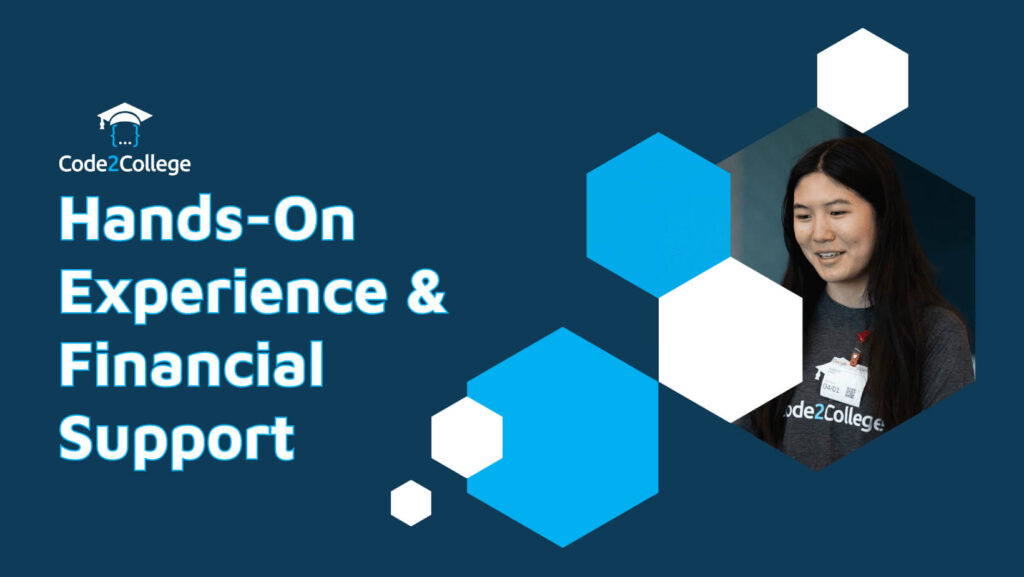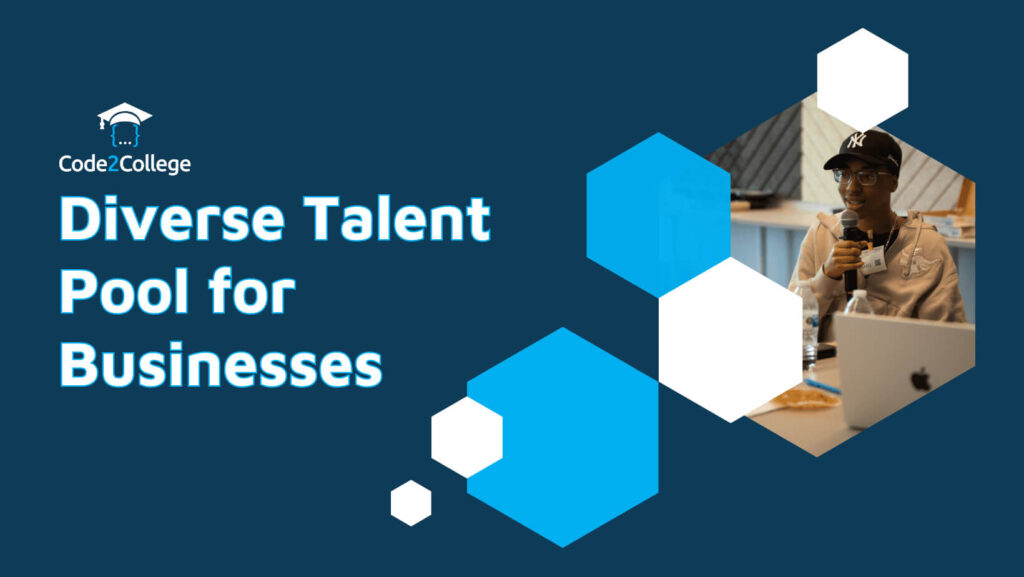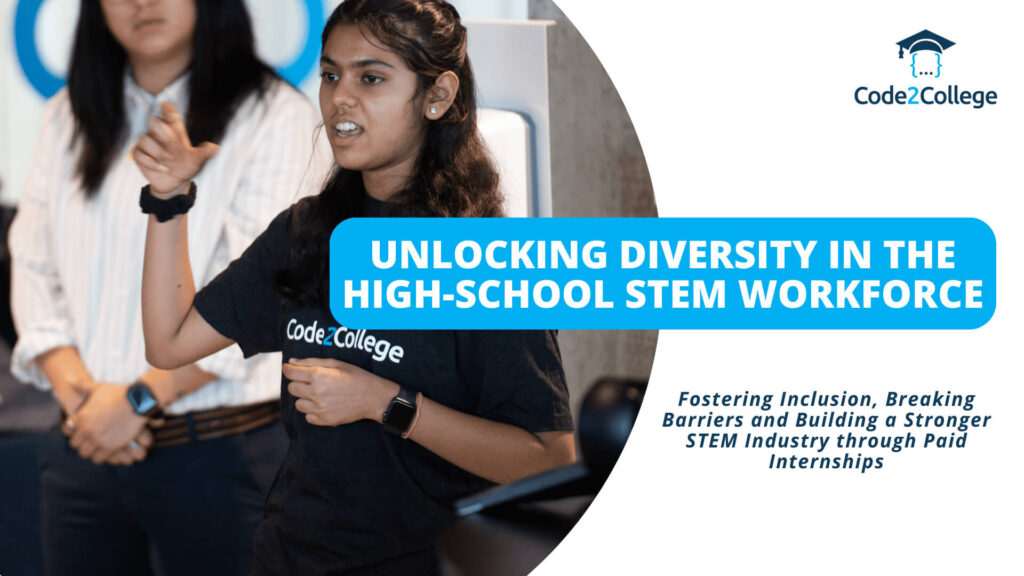According to recent studies conducted in the fields of science, technology, engineering, and mathematics (STEM), it has become increasingly evident that women and minorities continue to face significant underrepresentation, particularly in leadership roles within these fields. This stark lack of diversity not only hinders the industry’s ability to reach its full potential for innovation and progress but also perpetuates a cycle of inequality that has far-reaching consequences.
Recognizing the urgency to address this issue, organizations like Code2College have been actively working towards a solution that has garnered attention and support in recent years. Our approach involves providing paid internships specifically designed for high school students. These internships offer a unique opportunity for young women and minorities to gain practical experience, exposure to real-world STEM environments, and a chance to cultivate their interest and passion in these fields.
The Benefits of Paid Internships for High School Students

Paid internships play a crucial role in benefiting high school students who are interested in pursuing STEM fields. One of the primary advantages is the opportunity for hands-on experience that goes beyond what can be attained in a classroom setting. When students work alongside professionals in the industry, they are exposed to the practical aspects of a tech organization, witnessing firsthand the daily operations, project development processes, and problem-solving techniques. This immersive experience allows students to understand the intricacies of their desired field, obtain practical skills, and gain insight into the professional requirements and expectations.
By actively participating in real-world projects, students can apply their theoretical knowledge in practical scenarios, reinforcing their understanding and solidifying their passion for STEM disciplines. The exposure to industry professionals also provides valuable mentorship and guidance, allowing students to learn from experienced individuals who can share their expertise, offer career advice, and inspire students to explore various pathways within STEM.
Additionally, paid internships offer financial support, which is particularly significant for students who may face economic challenges. Unpaid internships often pose a barrier for low-income students, as they may be unable to afford working without compensation. By providing financial remuneration, paid internships eliminate this obstacle, ensuring that students from all socioeconomic backgrounds have equal access to these valuable opportunities. This is especially crucial for fostering diversity within the STEM workforce.
Historically, underrepresented communities have faced systemic barriers and economic disparities that hinder their participation in STEM fields. By offering paid internships, organizations like Code2College empower students from these communities to engage in internships, gain experience, and access the industry. This financial support not only provides a level playing field for all students but also helps break the cycle of socioeconomic inequality by opening doors to meaningful careers in STEM that were previously out of reach for many.
The Impact of After-School Programming on STEM Education

The after-school programming offered by Code2College plays a pivotal role in diversifying the STEM workforce by providing students with valuable opportunities to explore and engage with STEM fields outside of the traditional classroom setting. These programs offer a dynamic and interactive learning environment that encourages students to delve deeper into their interests and discover new areas of passion within STEM disciplines. Through hands-on activities, workshops, and projects, students are able to gain practical experience, enhance their problem-solving skills, and develop a strong foundation in STEM subjects. By exposing students to a wide range of STEM fields and providing them with the resources and support they need to explore their interests, Code2College’s after-school programs help to nurture and cultivate the next generation of diverse STEM professionals.
Moreover, Code2College’s after-school programs serve as a pipeline for paid internships, creating a direct pathway for students to transition from their learning experiences to real-world work opportunities. By forging partnerships with tech companies like National Instruments (NI), Q2, H-E-B/Favor Delivery, Atlassian, SailPoint, Polaris, WP Engine, LogicMonitor, Indeed, and many, many more, Code2College is able to connect students with industry professionals and expose them to various careers within the STEM field. These partnerships provide students with invaluable exposure to the inner workings of tech organizations, enabling them to gain a deeper understanding of the industry and the skills required to succeed.
By facilitating these connections and internships, Code2College not only offers students the chance to apply their knowledge in a professional setting but also opens doors for them to establish mentorship relationships, expand their networks, and receive guidance from experienced professionals. This direct pathway from after-school programs to paid internships significantly enhances students’ prospects of pursuing successful careers in STEM.
Furthermore, Code2College’s after-school programming plays a vital role in addressing the achievement gap that exists in STEM education, particularly for students from low-income communities. These students often face significant disparities in resources and opportunities, which can limit their ability to excel in STEM subjects. By providing access to high-quality STEM education through after-school programs, Code2College helps level the playing field for all students, regardless of their socioeconomic background.
How Paid Internships Can Increase Diversity in the STEM Workforce

Paid internships have a transformative impact on increasing diversity within the STEM workforce through several key mechanisms. One of the primary benefits is that they level the playing field, ensuring that all students, regardless of their financial background, have equal access to valuable opportunities in the industry. By removing the financial barrier to entry, paid internships enable more students from underrepresented communities to participate and gain crucial hands-on experience.
Previously, students from economically disadvantaged backgrounds may have been deterred from pursuing internships due to the financial burden of unpaid work. By providing compensation for their contributions, paid internships empower students to engage in internships without sacrificing their financial stability or compromising their families’ well-being. This financial support allows students to immerse themselves in the industry, develop their skills, and build a foundation for future employment in STEM fields.
Paid internships also contribute to the creation of a more diverse talent pool within STEM organizations. By actively recruiting and providing opportunities to students from diverse backgrounds, these internships foster a broader range of perspectives, experiences, and ideas. Diversity within an organization brings together individuals with unique viewpoints, cultural backgrounds, and problem-solving approaches. This diversity of thought fuels innovation, fosters creativity, and challenges traditional ways of thinking, ultimately leading to enhanced performance and growth within the organization.
Through paid internships, STEM organizations can tap into a wealth of untapped talent, ensuring that their workforce reflects the diversity of the communities they serve. This not only creates a more inclusive and representative industry but also strengthens the organization’s ability to tackle complex challenges and drive meaningful change.
And, as an added bonus, the impact of increased diversity extends beyond the organization itself. As the STEM workforce becomes more diverse, it serves as an inspiration and catalyst for future generations. When individuals from underrepresented communities witness individuals who share their backgrounds and experiences succeeding in STEM fields, it paves the way for greater aspirations and self-belief. Paid internships provide students with role models and mentors who can guide and support them on their STEM journeys.
By having access to diverse leaders and professionals within the industry, aspiring students from underrepresented communities can envision themselves pursuing STEM careers, breaking down the barriers and biases that have historically hindered their participation. This, in turn, creates a positive feedback loop, as increased diversity in the workforce leads to increased representation, opportunities, and support for future generations.
Conclusion
Paid internships offer numerous benefits to students interested in pursuing STEM fields. They provide hands-on experience that goes beyond the confines of the classroom, allowing students to witness the practical aspects of the industry and apply their theoretical knowledge in real-world scenarios. Additionally, paid internships remove the financial barrier that often prevents students from underprivileged backgrounds from pursuing valuable opportunities, ensuring equal access and fostering diversity within the STEM workforce.
The impact of paid internships extends beyond the individual students. By actively recruiting and supporting students from diverse backgrounds, these internships contribute to the creation of a more inclusive and representative industry. The diversity of thought and experiences leads to enhanced innovation, creativity, and problem-solving within organizations, ultimately driving growth and positive change.
As we strive for a more equitable and diverse society, paid internships play a pivotal role in breaking down barriers and inspiring future generations. By providing role models, mentors, and exposure to successful professionals from underrepresented communities, these internships pave the way for increased representation and opportunities in STEM fields.
In Part 2 of this series, we will delve deeper into the benefits of paid internships for high school students and explore the impact of after-school programming on STEM education. We will uncover how Code2College’s initiatives are nurturing and cultivating the next generation of diverse STEM professionals while addressing the achievement gap and empowering students from underprivileged communities.
